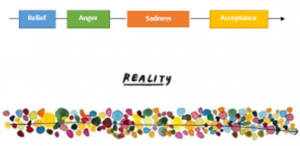What Does My Diagnosis Mean?
Autism Spectrum Condition is a neuro-developmental condition, which means your brain processes, perceives, thinks and responds to people, information and the world around you slightly differently. Whilst the associated difficulties are well documented, it also brings with it many strengths – including passionate interests and an eye for detail. Many people go through mixed emotions when receiving a diagnosis of ASD, so do not be surprised if this happens to you also.
You may go through some, all or none of the following emotions. This can be in any order, and you can revisit these emotions multiple times:
Relief – at realising there is a reason why you might feel or behave differently to others
Anger – at not having been diagnosed when young and thereby receiving support and understanding
Sadness – at realising this is a life-long condition
Acceptance – this is the end goal, and where understanding of yourself, what works for you and what doesn’t, helps reduce struggle in life.
An autism diagnosis can be hard to come to terms with. It can be difficult to understand what it means or how it will affect your life. You may not know a lot about autism which can make the diagnosis seem overwhelming.
Autism is a lifelong developmental disorder that affects how people perceive the world and interact with others. There is no cure for autism, but there are ways to help you cope, manage and even overcome some difficulties you may experience. People often describe having autism as part of their identity.
Aspiration (OAADSS post diagnostic service) run a 5 workshop post diagnostic course for newly diagnosed adults to help explain the condition and how it might affect you. For more information or to book a place contact the Aspiration Facilitators on Tel: 07824 309000 or email Aspiration@kingwood.org.uk
Some people find that once they understand the condition, it can help make sense of why they struggle with certain situations or experience difficulties. Having a diagnosis of autism may also help your family, partner, friends, colleagues understand why you experience specific difficulties. It might also help them to understand how they can help you with your difficulties.
Having a diagnosis of autism may mean you are eligible for help and support. You may be entitled to benefits and/or support services.
You may be interested in the following publications:
For everyone:
A Guide for Adults Following Diagnosis A particularly useful resource from the Welsh Government Autism Strategy group.
An Adult with an Autism Diagnosis Gillan Drew, Jessica Kingsley Publishers.
Autism and Asperger Syndrome in Adults Luke Beardon, Sheldon Press.
I Think I Might be Autistic: A Guide to Autism Spectrum Disorder Diagnosis and Self Discovery for Adults Cynthia Kim, Narrow Gauge Press.
For women:
Odd Girl Out: An Autistic Woman in a Neurotypical World Laura James, Bluebird.
Aspergirls: Empowering Females with Asperger Syndrome Rudy Simone, Jessica Kingsley Publishers.
Women and Girls with Autism Spectrum Disorder: Understanding Life Experiences from Early Childhood to Old Age Sarah Hendrick, Jessica Kingsley Publishers.
About Anxiety and Depression:
Asperger Syndrome and Anxiety: A Guide to Successful Stress Management Nick Dubin, Jessica Kingsley Publishers.
Asperger’s Syndrome and Anxiety: by the Girl with the Curly Hair: Volume 8 (The Visual Guides) Alis Rowe, Lonely Mind Books.
Overcoming Anxiety and Depression on the Autism Spectrum: A Self-Help Guide Using CBT Lee Wilkinson, Jessica Kingsley Publishers.
The Autism Spectrum and Depression Nick Dubin, Jessica Kingsley Publishers.
We have a lending library with a small selection of books which you are welcome to borrow. Please contact us for details.

